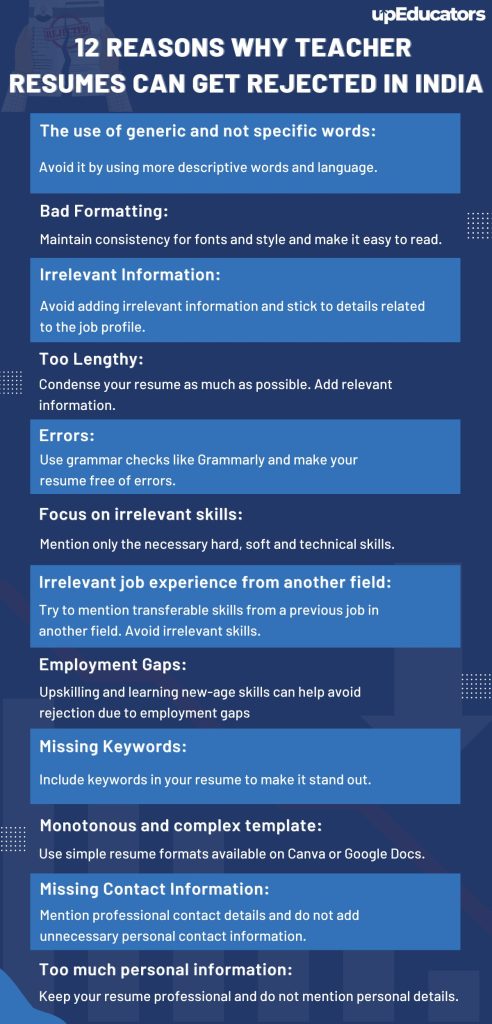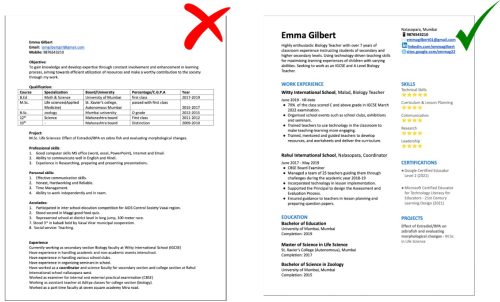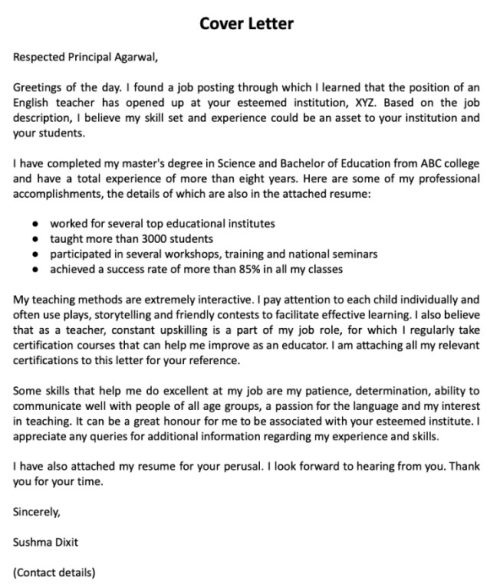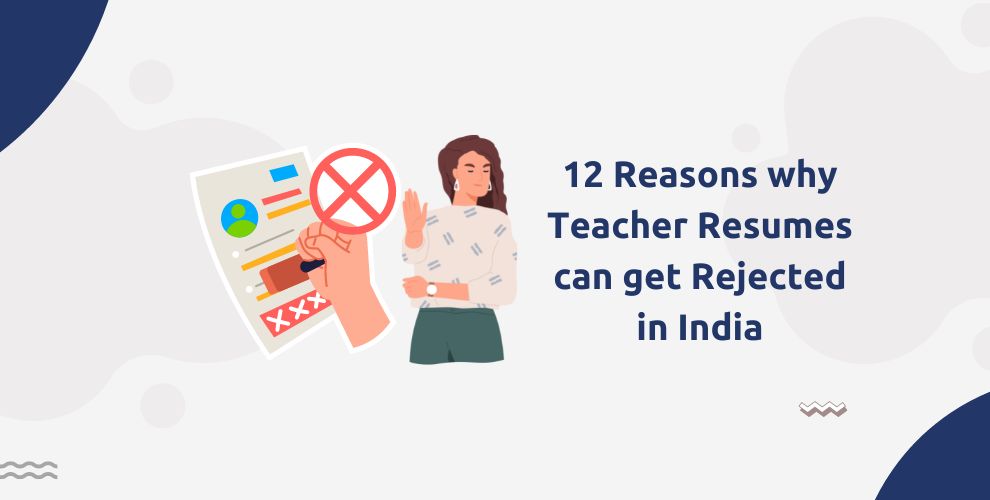Hiring managers and principals at educational institutes receive hundreds of applications for a single job role. Employers tend to spend no more than 6-10 seconds on one resume. Aspiring teachers applying for these jobs need a perfect resume to increase their chances of getting hired. Even insignificant errors on a teacher’s resume can get your resume rejected within quarters of a second.

upEducators has trained more than 5000 educators in developing digital and new age skills. The team at upEducators has scrutinized hundreds of resumes to find the common errors applicants commit that get their resumes rejected. If you are wondering why your resume got rejected, then this non-exhaustive list of reasons will help you detect these errors and get rid of them. But before jumping straight to the list, let’s find out why a well-drafted resume for teachers is crucial for getting hired.
Why is it Important to create the perfect teacher resume?
When you are a teacher, your resume is one of the most important tools that you have to market yourself to potential employers. It is important to create a resume that is well-written, accurate, and professional. To create the perfect teacher resume, you need to make sure that you include all of the necessary information and that you highlight your strengths. A well-written resume can help you to stand out from the competition and increase your chances of getting the job that you want.
Reasons why Teacher Resumes get Rejected:
1. Use of generic and not specific words
When it comes to writing a resume, it’s important to use language that is specific and tailored to your individual experiences and skills. Generic phrases and words can make your resume sound bland and uninteresting, and can lead to your resume being rejected.
Some examples of generic phrases to avoid include “responsible for,” “duties included,” and “worked with.” [“Responsible for teaching students”]
These phrases don’t give the reader any real information about what you did in your previous roles and don’t help to set you apart from other candidates.
How to Avoid:
Instead, try to use language that is more descriptive and paints a picture of what you accomplished in your previous roles. For example, use words like “mentored” ‘‘analysed’, ‘executed’, ‘delivered’, ‘boosted’ or ‘accomplished.’ [“Mentored students with special needs and help them improve their performance by 15%”]
2. Bad Formatting
When it comes to resumes, appearance matters. A poorly formatted resume is likely to be rejected by a potential employer, no matter how qualified the applicant may be.
There are a few simple rules to follow when it comes to formatting a resume. First, the document should be clear and easy to read. Second, it should be free of any grammar or punctuation errors. Finally, it should be consistent in terms of font size and style.
By following these simple guidelines, you can ensure that your resume will make a good impression on potential employers.
How to Avoid:
There are a few simple rules to follow when it comes to formatting a resume. First, the document should be clear and easy to read. Second, it should be free of any grammar or punctuation errors. Finally, it should be consistent in terms of font size and style.

3. Irrelevant Information
Your resume should be focused on your teaching experience and qualifications, and should not include other irrelevant information not related to the job description. Hiring managers are looking for candidates who are specifically qualified for the teaching position, and who will be a good fit for the institute. If your resume includes information that is not related to teaching, it will likely be rejected.
How to Avoid:
Focus on including keywords and information related to the job profile. For instance, stress your accomplishments as an educator rather than mentioning daily tasks you completed as a teacher.
4. Length of the Resume
A lot of teacher resumes are rejected because they are too long. Recruiters and hiring managers simply don’t have the time to read through pages and pages of information. Instead, they want a concise, easy-to-read document that highlights the most important information.
How to Avoid:
Try to condense your resume as much as possible. Include only the most relevant information and omit anything that is not essential. If you have a lot of experience, consider using a chronological resume format.
5. Errors
One of the most common reasons why teachers’ resumes are rejected is due to errors. Although it may seem like a small thing, even one mistake can be enough to disqualify a resume. This is especially true if the error is on the contact information or if there are multiple errors.
Many teachers’ resumes are rejected due to errors, such as incorrect grammar, punctuation, and formatting. To avoid having your resume rejected, be sure to proofread it thoroughly before submitting it. It may also be helpful to have someone else look it over to catch any errors you may have missed. By taking the time to ensure your resume is error-free, you’ll improve your chances of getting it accepted and landing the job you want.
How to Avoid:
Use tools like Grammarly to check errors and correct them.
6. Focus on irrelevant skills
Many teachers’ resumes are rejected due to a focus on irrelevant skills. Hiring managers / School Management are looking for candidates with the right mix of skills and experience, and if a teacher’s resume focuses too much on irrelevant skills, it is likely to be rejected. Teachers’ resumes should focus on skills and experience that are relevant to the job they are applying for, and they should avoid including irrelevant skills.
How to Avoid:
Mention necessary soft, hard and technical skills like conflict resolution, subject expertise, classroom management, time management, patience, collaboration and problem-solving skills.
7. Job Experience from another field of work
Teachers who have experience working in other fields may find their resumes rejected when applying for teaching jobs. This is because employers often prefer candidates with experience specifically in teaching. However, there are ways to overcome this obstacle. With a well-crafted resume and cover letter, teachers can increase their chances of getting hired despite having experience in other fields.
How to Avoid:
Candidates can highlight the transferable skills they have acquired in other fields that can be applied to teaching. They can also emphasize their commitment to the teaching profession and explain why they are making a career switch.
8. Employment Gaps
Teachers often face rejection when applying for jobs due to employment gaps on their resumes. Teachers who have been out of the workforce for a long time may not be up-to-date on the latest teaching methods and may not be able to meet the requirements of modern schools. As a result, teachers need to be prepared to explain their employment gaps and show how they will be able to contribute to the school.
How to Avoid:
Teachers can upskill and develop modern teaching methods and skills to keep up with the changing trends in education. Candidates can learn new age skills using platforms like Udemy or Coursera or even join live and interactive courses by upEducators like the Google Certified Educators course or the Microsoft Certified Educators course.
9. Missing Keywords
In today’s job market, it’s more important than ever to make sure your resume is optimized with the right keywords to pass the initial screening process. Many teachers are unaware of the importance of including keywords, or they simply don’t know which keywords to use. As a result, their resumes are getting lost in the shuffle.
How to Avoid:
If you’re a teacher on the job hunt, take the time to research which keywords are most important for your field and make sure they’re included in your resume. It could make all the difference in whether or not you get your foot in the door.
For example, Student-minded high school teacher with over 3 years of classroom experience instructing students in Class 6-8. Google Certified Educator and Teacher Eligibility Test certified. Improved students’ performance by 20% over the past 2 years. Seeking to become the middle school Math teacher at St John Memorial High School.
10. Monotonous and Complex template
Most teachers have a hard time creating a resume that will get them hired. One of the reasons for this is that they use boring and complex resume templates that do not stand out to potential employers. While well-written and formatted resumes are important, it is also crucial to use a resume template that is eye-catching and easy to read. To create a resume that will get you hired, you should use a template that is both simple and stylish.
How to Avoid:
Use formats available on Canva, Microsoft Word and Google Docs to create flawlessly formatted resumes.
11. Missing Contact Information
Candidates need to include their contact information on their resumes. Unfortunately, many resumes are rejected because this information is missing. Contact information should include a phone number and email address.
How to Avoid:
Make sure that you mention a professional email address and not a personal email address that is funky and informal. Without this information, potential employers will not be able to contact the teacher and discuss the job opportunity.
12. Too much Personal Information
Many teachers’ resumes are rejected because they include too much personal information. Personal information such as your age, marital status or the number of children can be seen as irrelevant to your professional qualifications.
How to Avoid:
Stick to the facts and keep your personal life separate from your professional qualifications when creating your resume.
13. Lack of a cover Letter
A resume without a cover letter is like a job application without a personal statement. A cover letter is an opportunity to introduce yourself to a potential employer and tell them why you are the best candidate for the job. It is also a chance to explain any gaps in your employment history or other qualifications. Without a cover letter, your resume may be rejected outright.
How to Avoid:
A well-written cover letter will give the employer a better understanding of who the applicant is and what they can offer the school. It is important to take the time to write a quality cover letter that will grab the attention of the reader.
Don’t know how to write a cover letter? Read this guide to make a stellar cover letter that lands you the job.

Resumes are the first step toward starting a professional journey. An applicant needs a well-crafted resume to make a lasting first impression on the employee. An error-free resume can increase the chances of getting hired. Thus, one must create a perfect, well-written well-formatted and error-free resume to create a good first impression on the hiring manager and take the first step toward your dream job.
Author: This article is written by Samiya Rashid for upEducators blog.




